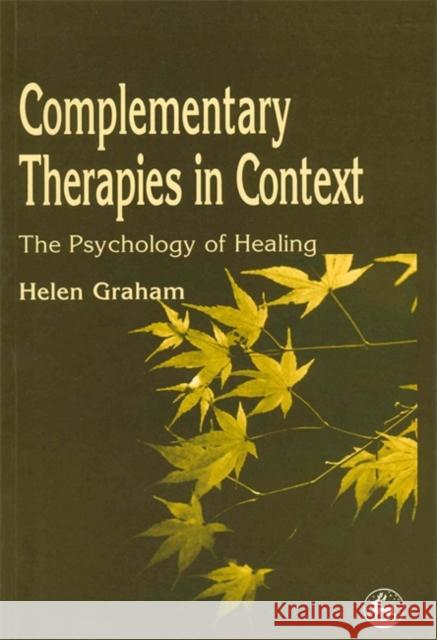Complementary Therapies in Context : The Psychology of Healing » książka
Complementary Therapies in Context : The Psychology of Healing
ISBN-13: 9781853026409 / Angielski / Miękka / 1999 / 320 str.
The author presents perspectives on healing of ancient Eastern and Western cultures.' - Drug Link All In all, Complementary Therapies in Context is a good resource book about the various non-traditional medical interventions, some over 4,000 years old.' -Psychiatric Services This is a detailed and comprehensive reference text for people wanting extensive background knowledge of complementary therapies and the background to their development. It also includes interesting sections on the complex relationship between eastern and western medicine; and how both have developed and progressed within the very recent past. It would be an invaluable text for a student writing a paper or a therapist looking to research further into potential areas for OT involvement.' OTPLD Newsletter This book provides a sophisticated, evidence-based argument for greater integration of complementary therapies in the NHS. A review of modern and ancient forms of healing reveal the inter-dependence of pysche and soma underlying eastern and western healing philosophies throughout history. Western physics has come to see the truth known to ancient mythologies that time and energy are interdependent therapies based on time-related stress, for example, hypnosis, meditation and relaxation, also mobilise healing energy, while energy'-based therapies, for example, homeopathy and acupuncture, also change perception of time. Modification of either of these factors has an effect on matter, or physical being, as these are all, inextricably inter-related.' OpenMind This book provides a good all-round introduction to ancient, modern, eastern and western perspectives on healing respectively. The author shows links and similarities where they exist, giving a useful synthesis for all students wanting to know where and how the different traditions evolved can be seen to fit into the larger picture. The classification of therapeutic interventions as being those of either time or energy is also a useful one. On time there is a good outline of the different schools of meditation, hypnosis and relaxation, including autogenic training and other developments. In-depth references to the debates surrounding different approaches give useful ammunition' for those wishing to prove the validity of these interventions. The chapter on visualisation is especially clear and inspiring. On energy, there is an outline of the chakras, as well as the story of the attempt to measure a biofield - including Kirlian photography. Radionics, colour and sound healing are among the other approaches covered. - This book may go a long way in convincing a diehard sceptic that serious consideration needs to be given to mind-body approaches and the new paradigm of health. For those already working with this approach to healing, the book is a very useful reference tool and provides the background with which to move forward.' - Holistic Health In this thoroughly revised, expanded and updated edition of the successful Time, Energy and the Psychology of Healing, Helen Graham examines perspectives on and approaches to healing from all over the world. She divides treatments into timely interventions' and energy medicine'. Timely interventions include biofeedback, hypnosis and meditation, which modify the individual's relationship to time and enable access to the unconscious. Energy medicine - acupuncture, homeopathy, psychosomatic treatments and psychoenergetic treatments - is concerned with the mobilization and balancing of the subtle energies in and around the individual. Helen Graham's study also embraces shamanism, mysticism, ancient Egyptian and Greek medicine, Buddhism, Taoism, Chinese, Indian and Japanese medicine, yoga, Galenism, and the divorce of psychology and medicine. She argues that these so-called alternative' therapies should be used in conjunction with conventional Western medical techniques.











